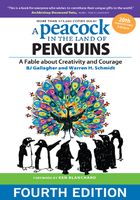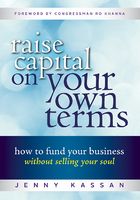I learned the lessons contained in this book during fifteen years of raising start-up capital for a variety of new businesses, in a number of countries, and I did so largely through trial and error. I completed thousands of investor presentations, hundreds of follow-up meetings, countless scores of due-diligence exercises, many term sheet negotiations, and dozens of successful closings with angel investors, venture capital firms, private equity funds, hedge funds, strategic investors, large commercial banks, and public market offerings. I have compressed fifteen years of capital-raising lessons into the pages of this slender book. If you study this book, you will raise your start-up capital. More importantly, you can then spend your fifteen years learning some other, more contemporary lessons. Thus is progress achieved.
Trial and error was a costly way to learn lessons; however, the advantage is that I ended up rock-certain of what works and what does not. Most of what entrepreneurs are taught in formal academic settings, or receive as advice from well-meaning friends and family, is rubbish. In some ways, it is worse than useless: entrepreneurs with transformational ideas are prevented from entering the business ecosystem: they are coached to knock on the wrong doors, they are taught to speak the wrong language, they are directed to travel the wrong roads. Dogged by their resultant failure to raise any meaningful capital, their spirits eventually flag. They give up, and the transformation that could have been is filed away in that sad folder where dreams go to die-the folder labeled "If Only."
I had the advantage of starting my first business after a successful career as a senior executive with Wells Fargo Bank. As I gained experience as an entrepreneur, I was able to recognize patterns of effective practices, and this allowed me to systematize my methods into an orderly formula. Many of my start-up protégés have followed these steps in successfully raising their own capital, and these methods have proven portable to worldwide markets, with successful capital raises accomplished in the United States, Europe, Australia, and the Middle East.
SECRET 1 Great business ideas do not get funded. Go back and read this phrase again. You will not find this assertion anywhere in the literature of so-called training for entrepreneurs. And yet it is an essential truth for raising capital. Of course, it seems reasonable, looking on from afar, that great business ideas would get funded. And this has led the pooh-bahs of the business world to focus the would-be entrepreneur on a set of mostly distracting tasks. What does get funded? Great business stories. And compelling business stories have a precise set of ingredients and an unvarying order in how those ingredients are organized. These blueprints are revealed in Secret 1.
SECRET 2 No investor will read your business plan. Think about that. Think of the millions of hours business students are frittering away creating long elaborate plans that will go unread. It must be somewhere close, in total wasted pages, to the count of unread novels by would-be authors. There may be value in learning how to construct charming sentences on a sheet of paper, but it is not related to the art of raising capital. There is an essential kit of presentation materials required to persuade an investor to write you a check, and-great news!-not one of them is a business plan. You will discover how to construct this essential kit in Secret 2.
SECRET 3 Money has a personality. What does that mean? It is not enough for you to raise start-up capital. Your capital partner has a distinct personality, most of which is preordained by the patch they have chosen to work within the vast geography of the global capital markets terrain. And personality matters, because your investor does not write you a check and then recede into the night. He or she becomes your long-term partner. What kind of partner is right for you, and who is your best long-term match? Secret 3 can save you not only a lot of time in fruitless matchmaking, but also a great deal of grief in avoiding a bad long-term marriage.
SECRET 4 Dating is your new job. This secret collects the chaotic and emotionally draining events of the capital-raising cycle into an easily learned routine: it's exactly like dating. This dating cycle will not resemble finding and marrying your high school sweetheart. Rather, you will assemble, over time, a network of sweethearts. And you will go on wooing and partnering with and occasionally getting dumped by old and new sweethearts alike, for as long as you are running a business, however large, however small. Your new job is dating.
SECRET 5 Raising capital can cost you your dream. This danger arises because when you persuade a professional investor to partner in your business, you will negotiate the terms of that investment. The investor has negotiated dozens or perhaps even hundreds of investments, and you have likely negotiated none. In effect, you have sat down at the table to participate in a high-stakes poker game, and, unaware of the consequences of your own ignorance, you have invited the professional poker players to teach you the game. They will. Secret 5 will prepare you to negotiate intelligently, to avoid fatal mistakes, and to discover breakthrough compromises on particularly thorny issues.
SECRET 6 The wire closes the deal. In the final flurry of document signing, list ticking, and funds wiring, you will need to adopt the obsessive behavior of a flight controller landing a large passenger airplane during a storm.
Your deal is not closed until the funds are in your business checking account, and until that finality occurs, every unmanaged detail is a danger to the successful conclusion of your months-long journey to raising capital. Secret 6 will present you with a series of simple and time-tested procedures for managing the chaos of a closing without pulling your hair out in the process.
At the end of each secret is a summary of the key points covered. Following that section, I offer a common myth, related to the topic of each secret, which has caused thousands of entrepreneurs to be working down the wrong path.
It is important to note the small number of essential lessons here: there are six secrets, not twenty-seven. Because these lessons grow out of my own first-hand experience, I have chosen to be brutally brief leaving out everything that may be nice but is not strictly necessary. This approach is similar to the difference between a novice backpacker and an experienced one. As a novice, you decide to go backpacking for the first time and step into REI to have the salesman outfit you with everything he says you will need. Then, once you hit the trail, you find out that the load is simply too cumbersome to carry and most of what you brought along is, in the actual event, useless or superfluous. As an experienced backpacker, you travel extremely light and burden yourself only with equipment that is absolutely essential and proven to work. This book travels light.
These six secrets also follow an established order. Using these secrets out of their natural order will not work. It would be like swinging at a tennis ball after it has gone past you. You may have the most perfect tennis stroke of all time, but it does not matter if the ball is not in a position to be struck.
While the six secrets encompass each step of the raising-capital process, there is one essential trait that holds them all together: commitment. Because you cannot learn commitment, no section of this book is dedicated to it. Commitment is a choice that you make. Are you committed to building the business in which you want your investor to invest? If you are not committed, the investor can sense it. You cannot pretend to commit; it cannot be faked. That is why the smartest investors always want to know what capital of your own has been put at risk in order to build your business. This is the closest proxy the investor can get for measuring your commitment. Investors care about your commitment because they know you are embarking on a long journey, full of many surprises and disappointments. There will be times when only your underlying commitment will see you through.
This is not a book of instructions on how to build a successful business. Building a successful long-term business is a complicated, multifaceted achievement, full of random occurrences that require split-second decisions, critical contributions from many people, and a lot of luck. This is simply a book on how to raise capital for your business so you can get onto the playing field. If you are not on the playing field, you cannot win the game.
Whether you follow the advice in this book or not, do not take the advice of those who have never raised their own start-up capital for their own start-up businesses. These well-meaning advisers are amateurs, no matter how talented they are as individuals or how lofty their position in their own field. Rule of thumb: If you want to know how to do something, talk to someone who has already done it, and more than once.
If you learn and apply the lessons in this book, you will gain more than the proficiency needed to raise the start-up capital to get your idea funded and off the ground. After incorporating the lessons learned, you will be prepared to engage in successive rounds of capital raising throughout the life of the business. If you find the idea of raising capital tiresome, you can entirely avoid this phase of business building by choosing to let someone else on your team raise the capital. But be forewarned how that turns out: the person who raises the capital will end up the leader of your business, not you.
Many of the best entrepreneurs are driven by their belief that they can make things better through their idea. They want their work to matter. They do not want to end up feeling like they are simply one of thousands of cogs in a giant corporate wheel, a wheel that would surely go on turning whether they came to work each day or not.
But to turn our ideas into realities, we need to raise start-up capital. Without that life-giving elixir, our ideas never see the light of day. They have no oxygen to breathe, they do not grow up to be anything, and the world will never know what could have been.
There is nothing inevitable about the business future. Steve Jobs and Steve Wozniak did not know that the company they created would one day be a dominant global high-tech brand. Walt Disney did not know, after being turned down by one hundred banks in a row for financing, that his initial theme park would spawn an entire worldwide entertainment industry. Mark Zuckerberg had no idea that his small college experiment would soon be valued as a company worth more than $50 billion. What turned their ideas into a reality, and gave them the chance to become what we now know them to be, was that these entrepreneurs found a way to transform their ideas into fledgling businesses. They raised enough capital to get going.
The next twenty to fifty years of the business future will likewise belong to those entrepreneurs who today, right at this moment, are busy finding a way to get going. Who is to say your idea cannot become a reality? Do you honestly believe that all the other entrepreneurs are smarter or more talented than you are? What is stopping you from becoming one of these entrepreneurs?
Study this book well. Go raise your capital. Make your idea into something real. Take your shot.
-Bill Fisher















